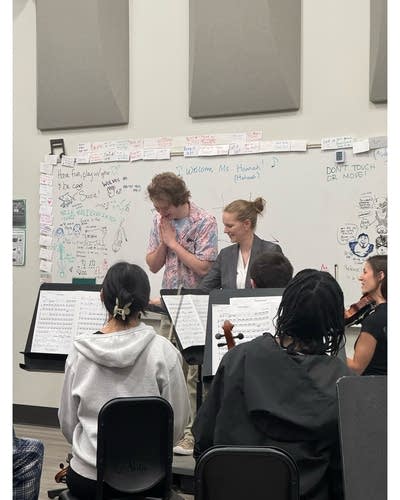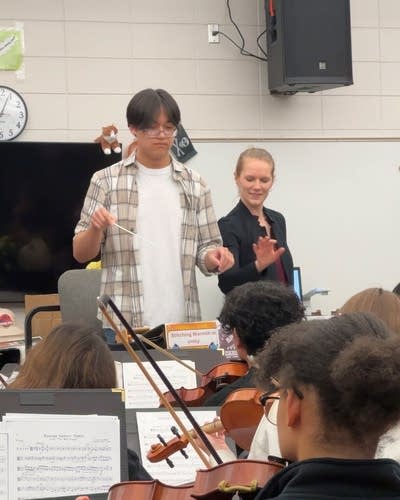What does a conductor really do? If you asked middle and high school students, they’d probably say a few different things. For example, the conductor helps the orchestra keep time, tells the musicians when to come in, and helps interpret the music — but that’s not everything. Conducting uses life skills, like listening and collaboration, to approach tasks like working with many different people and interpreting an ensemble’s sound.
YourClassical Fellow Anna Tessman, a lifelong violinist, was amazed to learn just how much work goes into conducting after taking a college conducting class with instructor and conductor Hannah Schendel. “I think I’d seen an orchestral score a few times before and always knew there was more to conducting than what we as musicians see,” Tessman says, “but after that class, and working with Hannah, I think understanding this as a younger musician can help students better understand the music as they play. It can also be inspiring to young women, seeing a woman lead an orchestra with a simple flick of her baton.”
It was because of this experience that Tessman decided to help younger students learn about a conductor’s job as part of her final outreach project at Minnesota Public Radio.
Tessman collaborated with Schendel to bring conducting master classes to students around the Twin Cities. Schendel is an active professional in the Twin Cities who works as the Cover Conductor for the Minnesota Orchestra, the Music Director for the Wayzata Symphony Orchestra, and conductor of the Carleton College Orchestra.
Tessman and Schendel went to three schools — South Washington County Park High School, Park Center High School and Maple Grove Middle School — to put on a conducting series that showed students what the many aspects of a conductor’s job looks like. “There’s a lot of behind-the-scenes work and there’s also in-the-moment rehearsal decisions that conductors have to make,” Schendel says. “[This project] gives the students a chance to know what a conductor does on and off the podium.”
Schendel encouraged each class to get up and move their bodies to slow and fast-paced pieces, and she taught the history and importance of conducting. The students then looked at an orchestral score and discovered what it was like to stand on the podium and conduct their peers.
Schendel says, “I believe that music is for everyone, and it has the power to transform our lives.”
To learn more about Hannah Schendel, visit her website.
Love the music?
Show your support by making a gift to YourClassical.
Each day, we’re here for you with thoughtful streams that set the tone for your day – not to mention the stories and programs that inspire you to new discovery and help you explore the music you love.
YourClassical is available for free, because we are listener-supported public media. Take a moment to make your gift today.



